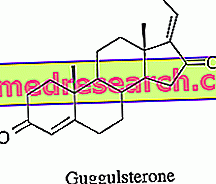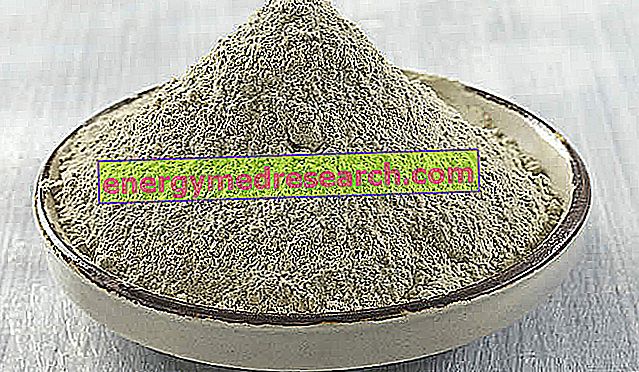Commiphora mukul is a thorny tropical plant, widely used in India, where in 1987 it obtained, still valid, sale authorization as a lipid-lowering product (useful for lowering blood levels of cholesterol and triglycerides). By etching its bark at the base of the trunk, it allows a resin to sweat, commonly called guggul gum, which is the drug. With a similar process, performed on a plant - Commiphora molmol - belonging to the same family, myrrh is obtained.

The drug, used in the West with the name of guggul gum, is the result of a series of chemical extractions aimed at concentrating the sought-after active principles and removing those responsible for the undesired effects.
The standardized extracts contain a substance called guggulipid, which in turn consists of steroid compounds called guggulsterones (gugglsterone E and gugglsterone Z).
The exact mechanism of action by which the guggulipid would explain its cholesterol-lowering and lipid-lowering activity is not yet clear. Among the various hypotheses put forward, there is also a possible stimulating action at the level of the thyroid gland, which would justify its use as a reductant of body fat ( Commiphora mukul is a common ingredient of many slimming supplements designed to elevate metabolism). Likewise, certainties about the true cholesterol-lowering efficacy of guggul are lacking.
During various clinical investigations, many of which were conducted in its territory of origin (India), guggul proved to be effective in reducing the values of total cholesterol, triglycerides and LDL, while increasing the HDL fraction (good cholesterol). Evidence has also emerged about its possible antiatherogenic and fibrinolytic action, useful in the prevention of serious cardiovascular events due to the formation of thrombi and atheromas (angina, infarct, stroke, intermittent claudication, deep vein thrombosis, etc.).
To be reported, in the opposite sense, a study published in the journal Jama in 2003 ( Szapary PO et al. Guggulipid for the treatment of hypercholesterolemia. JAMA 2003; 290: 765-72. ). This research, conducted on 103 hypercholesterolemic patients in Philadelphia (USA), not only did not show any positive effect attributable to guggul supplementation, but even showed a slight decrease in the HDL / LDL ratio compared to the placebo group. On the other hand, the sample of subjects who had taken guggulsterones over the course of eight weeks, registering an increase in plasma LDL, benefited from a modest drop in fasting blood triglycerides. The discrepancy with the results of previous studies probably lies in the genetic, bodily (greater fat mass) and dietary differences (lower fiber intake, greater fat intake) that separate the US population from the Indian population.
The extracts of Commiphora mukul are also given an anti-acne action.
Dosages : the therapeutic action of guggul was evaluated in several clinical studies by administering 500 mg tablets, containing 25 mg of guggulsterones, to be taken 3 times a day for a total of 1500 mg / day. In the aforementioned study by Szapary et al, dosages of 2 grams / day were achieved, without obtaining any beneficial effect.
Side effects : they are generally mild and limited to the appearance of skin rashes (redness, itching) in the first days of treatment in patients hypersensitive to extracts. There are also possible unwanted gastrointestinal reactions (nausea, vomiting, diarrhea, belching, hiccups), accompanied by headache and apprehension.
Warnings : guggul-based supplements are contraindicated in pregnancy and in the presence of chronic disorders of the gastro-intestinal tract, such as duodenal or gastric ulcers. Caution in simultaneous association with anticoagulants, be they synthetic (eg coumadin, aspirin) or of natural origin (gingko, pineapple stalk, garlic, nutmeg, tansy, sweet clover ...).
Guggul can reduce the plasma concentration of drugs such as propanol and diltiazem (both used in the treatment of hypertension).



